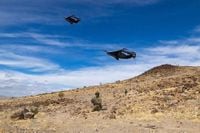In an unprecedented demonstration of military modernization, over 6,000 personnel from allied nations gathered in the challenging terrain of the western United States for a series of advanced technology tests under the U.S. Army's "Convergence Capstone 5" project. This event, taking place from March to April 2025 at the National Training Center at Fort Irwin, California, and various locations within the Indo-Pacific operational area, marked a significant step towards creating a data-centric, networked fighting force.
According to the U.S. Army Futures Command, the initiative aims to integrate new technologies and capabilities into a cohesive operational framework. "What the Convergence project does is bring together all our combat systems in one place," said Major General Zachary Miller, commander of the Army's Joint Modernization Command. "We are merging new technologies and capabilities with new organizational methods and assessing whether these help us achieve our combat objectives."
Among the innovations tested were drones and robotic vehicles, alongside new command and control systems. The Australian Army personnel, for instance, explored concepts like hyper-teaming, which allows a single soldier to manage multiple unmanned systems simultaneously. "We are enabling one soldier to do things that previously required multiple soldiers," stated Lieutenant Colonel Ben Pietersen from the 1st Armoured Regiment of the Australian Army. "As far as I know, our army has never done this before." This shift emphasizes a future where technology enhances individual capabilities on the battlefield.
Multinational teams also evaluated how artificial intelligence and data analytics could enhance real-time situational awareness and expedite decision-making processes. Colonel Toby Till, head of the U.K. Army's experimentation and testing unit, remarked, "This is a great opportunity to share with our key allies and partners under the Convergence initiative about the capabilities we are using and how we will employ them. Allies always need to fight together, and we must be able to share information. You must be able to transmit that data to conduct strike missions and achieve targeting outcomes."
The evaluation of new command and control capabilities involved testing experimental technologies in data infrastructure and communications, which were integrated with tactical vehicles to enhance network agility and survivability. The Army Futures Command noted that "Convergence Capstone 5 is not just an experimental project; it is a vital component of the ongoing transition within the U.S. Army." Insights gained from this activity will influence future readiness and modernization efforts, ensuring that joint forces remain at the forefront of military innovation.
Meanwhile, in a separate but significant development in the tech industry, Foxconn and Tata, major suppliers for Apple in India, reported record iPhone exports to the United States valued at nearly $2 billion in March. This surge reflects Apple's strategy to mitigate the impact of tariffs imposed by former President Donald Trump earlier this month. U.S. Customs data indicates that Apple has ramped up iPhone production in India while chartering cargo planes to transport 600 tons of iPhones to the U.S., ensuring ample inventory before Trump's tariffs could inflate import prices.
In April, the U.S. government announced a 26% tariff on imports from India, a figure that, while significant, pales in comparison to the over 100% tariffs on goods from China. Trump also suspended tariff collections from all countries for 90 days, except for China, which remains under scrutiny. According to Reuters, Foxconn exported smartphones worth $1.31 billion to the U.S. in March, marking the highest monthly figure on record and surpassing the combined value of exports from the previous two months.
Tata Electronics contributed to this surge, shipping iPhones worth $612 million in March, a 63% increase over February, primarily consisting of iPhone 15 and 16 models. Customs data revealed that Foxconn's shipments arrived at various U.S. locations, including Los Angeles, New York, and Chicago, which are among the largest import hubs.
Despite Trump's announcement to suspend tariffs on smartphones and electronics, he warned that this reprieve might only be temporary. Reports suggest that Apple has been lobbying Indian airport authorities to streamline customs procedures at Chennai Airport, reducing processing times from 30 hours to just 6 hours, and employing at least six cargo planes in operations to expedite shipments to the U.S. This proactive approach underscores Apple's commitment to maintaining its supply chain stability amid rising geopolitical tensions.
As military and corporate sectors adapt to changing landscapes, the outcomes of these initiatives will likely shape future operational strategies and economic partnerships. The Convergence Capstone 5 project exemplifies the military's commitment to integrating cutting-edge technology for enhanced combat effectiveness, while Apple’s efforts to diversify its supply chain illustrate the ongoing shifts in global trade dynamics.


